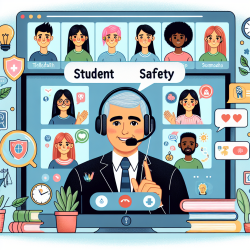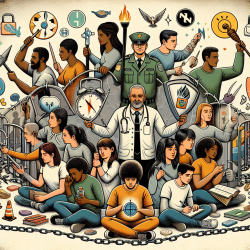Introduction
Bullying remains a significant issue in schools, affecting the physical and mental well-being of students. The research article "Students’ Willingness to Intervene in Bullying: Direct and Indirect Associations with Classroom Cohesion and Self-Efficacy" sheds light on how classroom cohesion and self-efficacy influence students' willingness to intervene in bullying situations. This blog explores the implications of these findings for practitioners aiming to enhance intervention strategies and outcomes in educational settings.
Understanding the Research
The study conducted by Wachs et al. (2018) involved 2,071 students from 24 schools in Germany. The researchers found that classroom cohesion and self-efficacy in social conflicts are key factors in students' willingness to intervene in bullying. Notably, 43% to 48% of students reported they would not intervene in bullying situations, highlighting a critical area for intervention.
Key Findings
- Classroom Cohesion: A positive classroom climate, characterized by strong cohesion and mutual respect, directly influences students' readiness to intervene in bullying.
- Self-Efficacy: Students with higher self-efficacy in handling social conflicts are more likely to intervene. This self-belief is crucial for overcoming the fear of negative peer judgment or becoming a target themselves.
- Indirect Effects: Classroom cohesion indirectly enhances students' willingness to intervene through increased self-efficacy, demonstrating the intertwined nature of these factors.
Practical Implications for Practitioners
Practitioners can leverage these insights to foster environments that encourage intervention and reduce bullying. Here are some actionable strategies:
- Enhance Classroom Cohesion: Encourage activities that build teamwork and mutual respect among students. This can be achieved through group projects, peer mentoring, and class discussions that promote inclusivity.
- Boost Self-Efficacy: Implement programs that build students' confidence in handling social conflicts. Role-playing scenarios and conflict resolution workshops can empower students to act decisively in bullying situations.
- Promote Positive Peer Relationships: Facilitate peer support networks where students can learn from each other and develop role models within their peer groups.
Encouraging Further Research
While this study provides valuable insights, further research is needed to explore the dynamics of bullying intervention across different contexts and cultures. Practitioners are encouraged to engage in or support research initiatives that expand our understanding of these critical issues.
To read the original research paper, please follow this link: Students’ Willingness to Intervene in Bullying: Direct and Indirect Associations with Classroom Cohesion and Self-Efficacy.










